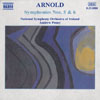Arnold Symphonies Nos. 5 and 6
View record and artist detailsRecord and Artist Details
Composer or Director: Malcolm Arnold
Genre:
Orchestral
Label: Naxos
Magazine Review Date: 6/2001
Media Format: CD or Download
Media Runtime: 57
Mastering:
DDD
Catalogue Number: 8 552000

Tracks:
| Composition | Artist Credit |
|---|---|
| Symphony No. 5 |
Malcolm Arnold, Composer
Andrew Penny, Conductor Malcolm Arnold, Composer National Symphony Orchestra of Ireland |
| Symphony No. 6 |
Malcolm Arnold, Composer
Andrew Penny, Conductor Malcolm Arnold, Composer National Symphony Orchestra of Ireland |
Author:
Very well played and warmly recorded, this is a welcome addition to the Naxos cycle of Arnold symphonies, coupling two works that reveal the composer at his very peak as a symphonist. Ironically, No 5 (1961), arguably the finest of all, initially received a frosty reception at its premiere in Cheltenham.
One can still see what disturbed those first listeners expecting more of the earlier, extrovert Arnold. The jagged, fragmentary argument of the first movement never quite settles despite moments of release, and the result is disconcertingly equivocal. Then the contrast of the slow movement’s opening, overtly Mahlerian tune initially seems incongruous. Yet with that theme ever more poignant in its hushed reprise, the boldness of the disparity reveals a true symphonist, as do the sharp contrasts of the third and fourth movements, including a drum-and-fife theme in the finale, all the more disturbing for quickly leading back to darkness – joy snatched away.
Symphony No 6 is similarly dark and disturbed in the Energico first movement, then gaunt and bare in the slow movement. The heroic theme in polonaise rhythm which opens the finale in this three-movement work again leads back to darker argument, until, almost as an afterthought, Arnold resolves the major-minor conflict underlying the whole work with an emphatic major chord at the end. Even that is disturbing for taking you by surprise.
Andrew Penny draws fine, concentrated playing from the National Symphony Orchestra of Ireland, with brass and percussion in particular brilliantly caught. As a bargain version this wins the highest recommendation, yet go to the identical Chandos coupling and you get performances that are not just more polished, weightier and even more richly recorded, but are more overtly emotional. The Mahlerian tune of No 5 with Hickox has a hushed intensity that makes Penny seem a little too plain and detached, and Arnold himself on his 1972 version for EMI is similarly warmer. The fortissimo return of that theme in the finale finds Hickox and Arnold pulling out all the stops, where Penny keeps just a degree of restraint, which some may well prefer. Whichever you choose, these are masterly works that deserve to be far better known
One can still see what disturbed those first listeners expecting more of the earlier, extrovert Arnold. The jagged, fragmentary argument of the first movement never quite settles despite moments of release, and the result is disconcertingly equivocal. Then the contrast of the slow movement’s opening, overtly Mahlerian tune initially seems incongruous. Yet with that theme ever more poignant in its hushed reprise, the boldness of the disparity reveals a true symphonist, as do the sharp contrasts of the third and fourth movements, including a drum-and-fife theme in the finale, all the more disturbing for quickly leading back to darkness – joy snatched away.
Symphony No 6 is similarly dark and disturbed in the Energico first movement, then gaunt and bare in the slow movement. The heroic theme in polonaise rhythm which opens the finale in this three-movement work again leads back to darker argument, until, almost as an afterthought, Arnold resolves the major-minor conflict underlying the whole work with an emphatic major chord at the end. Even that is disturbing for taking you by surprise.
Andrew Penny draws fine, concentrated playing from the National Symphony Orchestra of Ireland, with brass and percussion in particular brilliantly caught. As a bargain version this wins the highest recommendation, yet go to the identical Chandos coupling and you get performances that are not just more polished, weightier and even more richly recorded, but are more overtly emotional. The Mahlerian tune of No 5 with Hickox has a hushed intensity that makes Penny seem a little too plain and detached, and Arnold himself on his 1972 version for EMI is similarly warmer. The fortissimo return of that theme in the finale finds Hickox and Arnold pulling out all the stops, where Penny keeps just a degree of restraint, which some may well prefer. Whichever you choose, these are masterly works that deserve to be far better known
Discover the world's largest classical music catalogue with Presto Music.

Gramophone Digital Club
- Digital Edition
- Digital Archive
- Reviews Database
- Full website access
From £8.75 / month
Subscribe
Gramophone Full Club
- Print Edition
- Digital Edition
- Digital Archive
- Reviews Database
- Full website access
From £11.00 / month
Subscribe
If you are a library, university or other organisation that would be interested in an institutional subscription to Gramophone please click here for further information.




